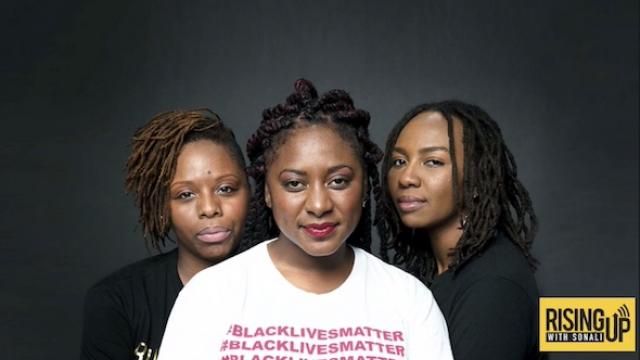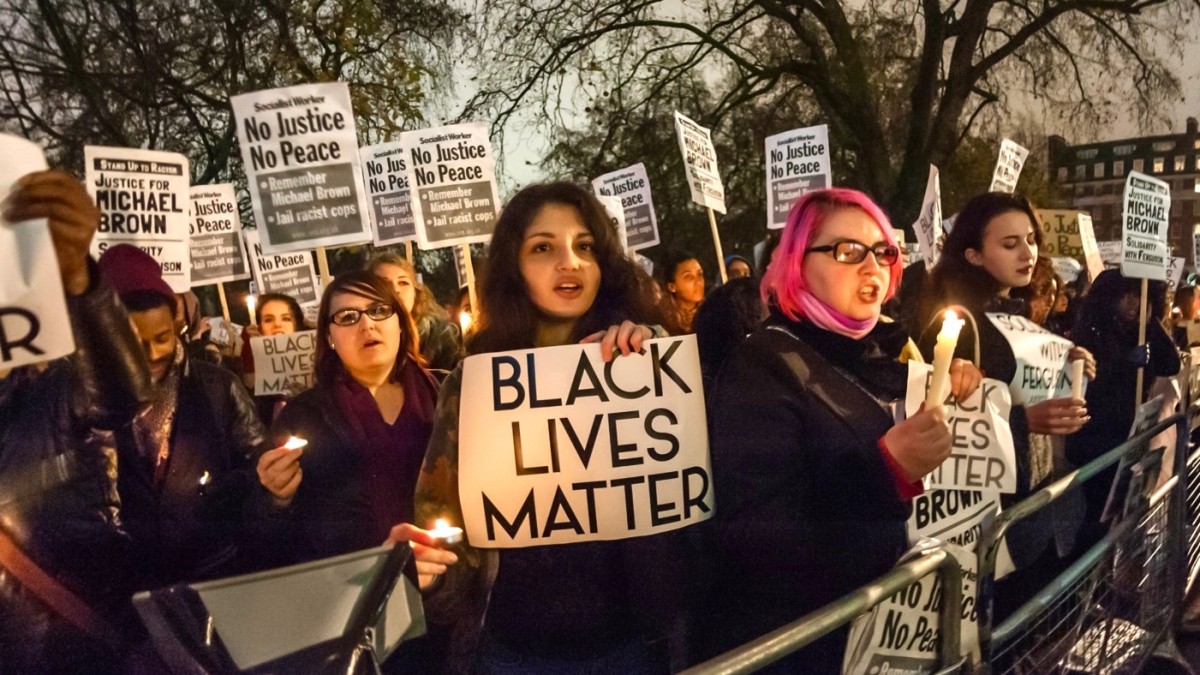
In July 2013, Patrisse Cullors, Opal Tometi and Alicia Garza, three prominent activists in their communities, joined together and coined the simple yet powerful refrain “Black Lives Matter” in response to the acquittal of George Zimmerman in the shooting death of Trayvon Martin. A year later, an uprising in Ferguson, Mo., over the police killing of Michael Brown catapulted the phrase and the activists it empowered into a movement.
The three African-American women, considered the co-founders of Black Lives Matter (BLM), have received awards and accolades and have been widely interviewed in major media outlets and invited to give speeches. Through it all, they have stuck to their principles and inspired a new generation of activists. They have challenged us to think beyond quick fixes and knee-jerk reactions, warning against an overreliance on electoral politics and demanding nothing less than societal transformation.
I recently interviewed BLM co-founder Garza about what has changed on this third anniversary of the birth of the nation’s most important contemporary social and political movement. Garza is a special-projects director in the Oakland, Calif., office of the National Domestic Workers Alliance and serves on the board of directors for the Oakland-based School of Unity and Liberation (SOUL). Like her fellow activists, Cullors and Tometi, she has been politically engaged and organizing for years, and the wisdom born of her experience was tangible throughout our conversation. According to Garza, “Race, policing and the multiple ways in which state-sanctioned violence impacts our communities has become an issue that is front and center,” and BLM’s main success has been in achieving a “cultural shift that is moving through this country,” one that is “necessary for real policy change to happen.”
She’s right. We are able to talk about race and racism more freely today than before, and combined with our unprecedented peer-to-peer communications technology, Black Lives Matter has provided a broad framework for Americans to debate and discuss the myriad ways in which society has failed black Americans—more so, perhaps, than any other community.
Take the brilliant speech by “Grey’s Anatomy” actor Jesse Williams at the BET awards, where he skewered white supremacy and privilege so eloquently that he left both his admirers and detractors speechless:
“[W]e’re done watching and waiting while this invention called whiteness uses and abuses us, burying black people out of sight and out of mind while extracting our culture, our dollars, our entertainment like oil – black gold, ghettoizing and demeaning our creations, then stealing them, gentrifying our genius and then trying us on like costumes before discarding our bodies like rinds of strange fruit.”
I imagine that the phrase “Black Lives Matter” has empowered and re-energized so many of us that Williams felt able to publicly speak out about such a controversial issue with deep clarity and courage. Garza lauded Williams, alongside other celebrities such as Beyoncé and Kendrick Lamar, whose actions, “send a particular wave of shock not only through their industry but also through the communities that love them.” Because of the cultural shift over the past three years, “There’s tons of folks now who are taking a stand and making sure that everybody knows that we are grappling with this fundamental question of dignity and humanity,” Garza said.
On a practical level, however, there has been little change. Police continue to kill African-Americans and other people of color with impunity, as the killings this week of Alton Sterling in Louisiana and Philander Castile in Minnesota demonstrate. And, among the very few officers who are ever indicted or charged, there are still almost no convictions. If even a few police were convicted of murder or manslaughter and sentenced to a decade in prison, it might send ripples through law enforcement agencies with the clear message that open season on black lives is over.
But Garza was adamant that systemic change does not come simply from convicting police who kill. “When we think about what change looks like, prosecuting or convicting a few police officers doesn’t actually transform the system itself and those officers are products of those systems.”
Transformation is what Garza, Cullors and Tometi are demanding of American society, for this country has never cared for black lives. To expect a system of policing (and all the institutions of power that police protect) to undergo a few tweaks in order to accommodate full equality for African-Americans is asking too much. “It’s really important that we understand transformation, one, [that it happens] on a much longer trajectory,” said Garza, “two, in terms of the interrelationship between cultural change and policy change; and three, as a reimagining of alternatives that get put into place for systems that we are trying to dismantle.”
In other words, the cultural shift that is reflected by black celebrities and others is just the first step. Convictions of police officers who killed unarmed people “are a step, but they are not the step to reforming, and transforming how policing is operating in our communities,” Garza insists. She says real transformation can only happen when police departments get the “clear message that it is unacceptable to be killing people in the course of ‘keeping people safe.’ ”
BLM’s focus is not restricted to problems of policing. Police violence is the most dramatic representation of state violence against black communities, but there are myriad other connected issues. Oakland, where Garza is based, is a historically black city and has a rich and storied background of militant black activism, especially as the birthplace of the Black Panther Party. But in recent years Silicon Valley’s tech industry workers have left expensive San Francisco looking for cheaper rents and turned Oakland into the site of a war over gentrification. Garza sees the problems of policing, gentrification, poverty and unemployment as intimately linked. “You can’t separate police violence from gentrification because police violence and policing is often used to bolster those processes,” said Garza, who has worked in the San Francisco Bay Area on this issue for more than a decade.
Ironically, many tech workers see themselves as liberal or libertarian and even embrace the ideals of BLM in a theoretical sense. Facebook founder Mark Zuckerberg famously scolded his employees publicly for crossing out the phrase “Black Lives Matter” on company walls and replacing it with “All Lives Matter.” But Garza is concerned that “there is a dissonance” between stated values and actual actions within the Bay Area-based tech industry.
In San Francisco she found that “there was lots of talk around social justice and fairness but yet there was almost a separate and unequal way of engaging with the community that tech was really pushing.” For example, to get around San Francisco’s failing public transportation system, tech companies simply started private bus systems, using public infrastructure, for their employees. This blindness to the plight of vulnerable populations is a microcosm of the American white supremacist culture that BLM has been battling.
Today, thanks to the resonance of Black Lives Matter, Garza, Cullors and Tometi enjoy much greater spheres of influence than before. I asked Garza whether the glare of the public spotlight has helped or hurt her activism. As she had done throughout our conversation, she gave a nuanced and deeply insightful answer: “It helps us get our message out to more people than already agree with us.” But, she added, “I think people can confuse visibility with power. The reality is the conditions in our community are not that different [from before].”
BLM has blossomed into a serious political movement through the activism of the black community, some of whose members are new to organizing. Now, it is up to the rest of us to expand on the work of the past three years—to move beyond cultural shift into real transformation, so that with visibility comes power to make black lives really matter.
3 WAYS TO SHOW YOUR SUPPORT
- Log in to post comments















